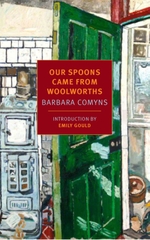“I told Helen my story and she went home and cried.” So begins Our Spoons Came from Woolworths. But Barbara Comyns’s beguiling novel is far from tragic, despite the harrowing ordeals its heroine endures.
Sophia is twenty-one and naïve when she marries fellow artist Charles. She seems hardly fonder of her husband than she is of her pet newt; she can’t keep house (everything she cooks tastes of soap); and she mistakes morning sickness for the aftereffects of a bad batch of strawberries. England is in the middle of the Great Depression, and the money Sophia makes from the occasional modeling gig doesn’t make up for her husband’s indifference to paying the rent. Predictably, the marriage falters; not so predictably, Sophia’s artlessness will be the very thing that turns her life around.
Comyns’s world is weird and wonderful… there’s also something uniquely original about her voice. Tragic, comic and completely bonkers all in one, I’d go as far as to call her something of a neglected genius.
—Lucy Scholes, The Observer
Comyns has a pictorial eye, and though she wrote stories from a young age, she originally thought of herself as a sculptor and painter...[her] wild but exact style is always instantly recognizable, a mix of looseness and compression.
—Jé Wilson, The New York Review of Books
A surprisingly charming and funny novel. . . . Much of the story revolves around issues of reproduction, housework, and economic opportunity. . . . But Sophia narrates a story of fairy-tale-like fatality, casting an amused, self-deprecating light on even the most painful moments.
—Kirkus Reviews, starred
A startling, immersive excavation of poor, young womanhood and marriage gone awry in 1930s London.
—Jane Yong Kim, BOMB magazine
Our Spoons contains one of the best distillations of Comyns' peculiar style currently available stateside, and is essential for understanding her dark, delightful oeuvre...calculatedly meek, yet sharp enough to give you paper cuts.
—Amy Gentry, Chicago Tribune
Her capturing of youth is so fresh and accurate that nothing is lost in the passing of decades. There is a modern sensibility at play in her women and their experiences, their attitudes and reactions towards love and sex, marriage and having children...quietly startling...Comyns’s skill is subtle and surprising...I felt both thrill and pride, and I expect as her work continues to be reissued this sense of finding a hidden gem will be shared by other readers, startled and attracted by her talent.
—Lauren Goldenberg, Music and Literature
A curious hybrid: a mixture of domestic disaster, social commentary, comedy, and romance...What I find so really excellent in this novel, in addition to Comyns’s powers of description and the slow fuse of her comedy, is her ability to show the cold world and its indecencies without spelling everything out...Comyns is a virtuoso at portraying bad behavior...written beautifully, with dash and economy, and…truly unique in [its] eccentric black comedy, whether grotesque or ineffably subtle.
—Katherine A. Powers, The Barnes & Noble Review
I defy anyone to read the opening pages and not to be drawn in, as I was… Quite simply, Comyns writes like no one else.
—Maggie O’Farrell
Comyns’s voice has childlike qualities; she looks at everything in the world as though seeing it for the first time. In later books, though, her narrators’ naivety is deployed in order to provoke horror; the gap between what the reader knows and the narrator doesn’t serves to make the reader fascinated and fearful.
—Emily Gould, The Awl


